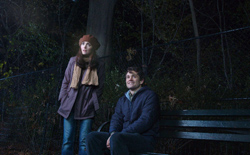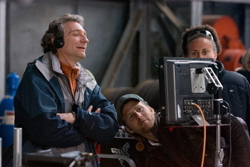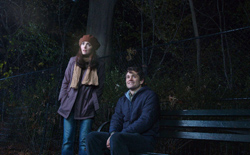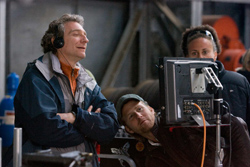Relationships are hard. And most of us have at least one person in our lives who can make a relationship especially difficult, but we do the hard work of making it work anyway because it’s a relative, a spouse, a longtime friend—or simply out of unconditional love. Even then, we often need some divine help.
Most of us don’t seek out such relationships, especially if there’s any inkling that there’s going to be a rough road ahead. But that’s just what happens in Adam, a warm and wonderful new romantic comedy now playing in limited release.

The title character, played with remarkable authenticity by Hugh Dancy, is a 30-ish single man with Asperger’s syndrome—an autism spectrum disorder that often includes extreme social disabilities. “Aspies” have difficulty looking people in the eye, reading typical social cues, and having normal conversations. Though they are often quite bright, they often have limited interests and “one-track minds.” They can also be moody.
It can be very difficult for a “neurotypical” to relate to an Aspie—and vice versa. I should know: I’m the parent of a young adult male with the disability (combined with bipolar disorder!), and life is never easy in our home.
But even without that personal connection, I’m sure I would’ve found Adam to be one of the better films of the year, in its depiction not only of a person with the disorder, but of someone who chooses to love him anyway. Beth, played wonderfully by Rose Byrne, is Adam’s new neighbor who falls for him despite his social quirks.
CT Movies recently sat down with Dancy, Byrne, and writer/director Max Mayer to discuss the film and its meaning for viewers.
Dancy (Confessions of a Shopaholic, Beyond the Gates) says that though he didn’t know anything about Asperger’s syndrome, he was drawn to the role because the script “was extremely well-written” and after a conversation with Mayer, “who told me more about the condition and what it would entail for me in trying to create that character.”
Dancy thrived on the challenge: “The more I learned about Asperger’s, the more nervous I was about taking it on. But I knew what I was getting into, I knew the many ways we could mess it up. But Max had done such a good job in allowing for humor in the story without doing at the expense of Adam—or ever suggesting that it was going to be easy.”
He says it’s the hardest role he’s ever played. “It’s the furthest distance I’ve ever had to travel emotionally, in trying to imagine what the character’s life is like. Somebody with Asperger’s is wired differently. They’re constantly having to make up that distance between themselves and other people, to think through that process of, What the hell is going on here? That process never stops for them. I never got to the point where I was comfortable with that, because it’s so counterintuitive to me. The qualities you normally emphasize as an actor—communication and empathy and responsiveness—are the exact opposite of what I was given to work with here. So yeah, it was a stretch.”
Byrne (Knowing, Marie Antoinette, Troy) was “immediately drawn to the script. The writing was just wonderful. I’ve played a lot of characters in genre films, but this was an opportunity to try something really different. It was quite liberating.”
‘What is this about for me?’
Mayer got the idea for the story when he listened to a radio show about a man with Asperger’s: “He was talking about how the world felt to him, and his challenges. I was really moved by what he had to say, and I don’t usually get that moved. I thought, Hmm, I’d better look into this some more. So I started doing some research.”

Mayer says has wasn’t even thinking of making a film at that point, but was “interested in my own response as much as anything: What is this about for me? I think [my interest] has something to do with growing up as an only child and the way I observed the world, and seeing all these other kids who knew who to talk to and what to talk about.
“Also, I was in a marriage which had the best of intentions on both sides, but it was on the rocks. So for me, this story was about these deep communication and trust issues. And the more I learned about Asperger’s, the better metaphor it felt like for human relationships in general.”
When asked what makes Adam different from Rain Man, A Beautiful Mind, Forrest Gump, or any other film about mental illness/disabilities, Mayer replied, “In the Asperger’s community, they say if you know one person with Asperger’s, you know one person with Asperger’s. This is a story about one person with Asperger’s. I wasn’t trying to write about all people with Asperger’s; you can’t do that.
“I love this character. He’s a particular individual with his own set of challenges and his own virtues. There are lots of stories about neurotypicals, and people with Asperger’s or other disabilities are as varied as anyone else.”
Mayer said he took care to write a comedy in such a way that it wasn’t making fun of the character or the disability. “People are funny,” he says. “And one thing that makes relationships possible is a sense of humor. That’s the thing about Beth’s character. She can laugh at herself and at Adam, and she doesn’t discriminate. She’s an equal opportunity humor appreciator. The test for me is, Is it truthful? If the humor felt truthful to the characters, then let the chips fall where they may.”
Researching the syndrome
Dancy says he did a lot of research online about Asperger’s before shooting began, and read books about Aspies called Look Me in the Eye and Born on a Blue Day and some of the writings by Temple Grandin.
“What I was looking for were those voices that stood out and had a sense of humor, something that would take me back to the script and that would trigger my imagination with regard to this story we were creating,” he says. “I also met some Aspies, including some who were similar to Adam on the spectrum. It was helpful to see some more extreme versions of the symptoms as well as seeing people that demonstrated fewer symptoms.”
Byrne, who has a family friend with Asperger’s, says Dancy “did a really remarkable job in how accurately he portrayed the role. It’s such a huge responsibility to play someone with this condition, wanting to do it right and be truthful to the condition.”
As for her own character, Byrne says Beth had to be “a specific type of person who would not run away in terror from these symptoms. When I read it, I totally believed the whole thing. It rang true. The script unfolds very gently, and at one point, you think she won’t get together with Adam. But Beth is very inquisitive and curious, and has a tolerance and patience about her. And she’s a great conduit for the audience to see Adam . . .”
Dancy cuts in: “She’s a great conduit because she doesn’t feel like a conduit. She’s just a character. You don’t feel like, Oh, this is going to be my guide into the world of Asperger’s. You feel like, Here is a person who’s combination of background and experience with other men draws her to this guy. It just feels organic, and you feel like you’re just watching a story of two people rather than a story about the syndrome, which is the way it should be.”
Good relationships take work
Dancy, Byrne and Mayer all said that educating the audience about Asperger’s was not their main goal in making this film, but simply a by-product of telling a good story well. And they also hope that audiences will pick up on the notion that all good relationships—whether with fellow “neurotypicals” or not—require some hard work.
Says Dancy, “If anything, the drive was to tell a story that would resonate way outside of the context of just Asperger’s. Hopefully people will connect with the story but at the same time see something in it that they recognize—something universal about the difficulties of making connections with another human being. And for those with the gift of empathy, or for those to whom it doesn’t come naturally, how we have to force ourselves employ it and exercise it.”
Mayer adds, “I like stories where everybody has a legitimate point of view and they bring it all to the table, and then the audience has to have this conversation about it. I think Beth’s sense of humor—being able to laugh at yourself—is really important in dealing with people in general, but especially with people who are hard to deal with. It’s hard, but it’s worth the effort.”
To read our review, click here. To see the trailer, click here. To learn if Adam is playing near you, click here.
Copyright © 2009 Christianity Today. Click for reprint information.










